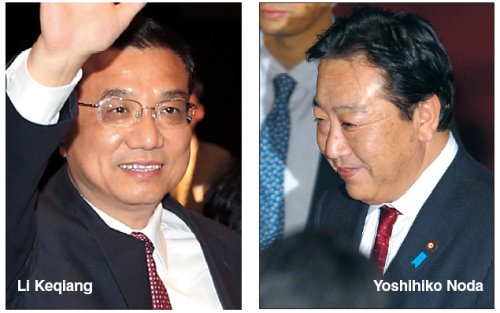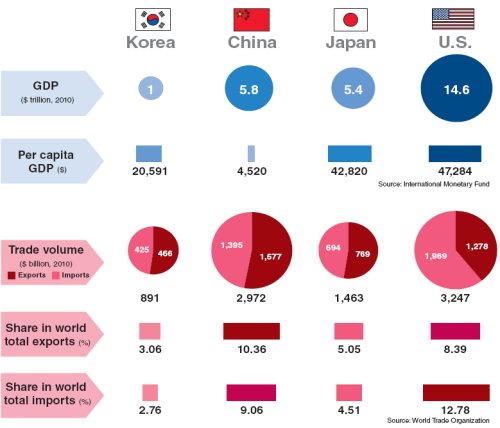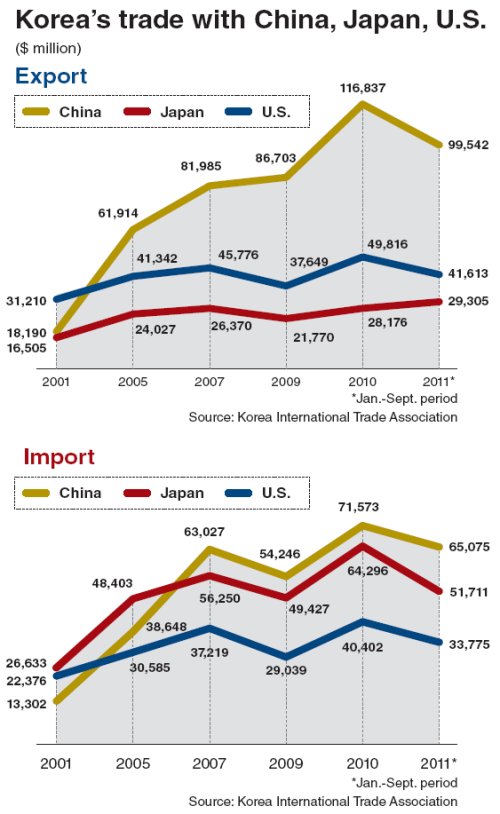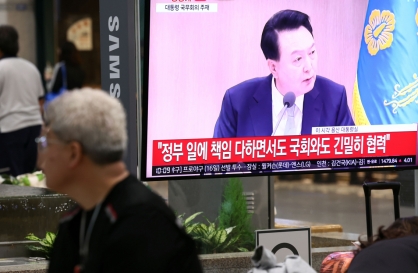Korea positioned to take lead in forging trilateral accord with China, Japan
With the parliamentary ratification of a free trade deal with the U.S. held back by a prolonged standoff between the two main parties, Korea agreed to expand its currency swap deals with China and Japan last month.
It signed an agreement to double its currency swap arrangement with China to $57 billion last Wednesday during a visit to Seoul by China’s Vice Premier Li Keqiang. The accord with Beijing came only a week after Seoul agreed to increase its swap facility with Tokyo to $70 billion from $13 billion during Japanese Prime Minister Yoshihiko Noda’s trip here.

The moves were largely welcomed by local experts as further strengthening the country’s ability to protect its financial system from turmoil in the eurozone, though some traders were concerned that the new arrangements might cause the won to appreciate, hampering Korea’s export competitiveness.
“A new safety net has been added to an already well-weaved net,” an official at the Bank of Korea said after the currency swap deal with China was concluded.
Combined with Korea’s foreign exchange reserves of $303 billion, the latest deals have expanded the country’s emergency liquidity beyond its foreign currency debt of $400 billion.
Noting the currency swap agreements would help strengthen economic cooperation with China and Japan, experts here say the momentum should be utilized to accelerate the process of forging a free trade deal between the three Northeast Asian nations.
The prolonged global financial crisis exacerbated by eurozone’s debt problem has made the three countries feel more need to further boost economic cooperation and trade among themselves.
“As U.S. and European markets are expected to continue shrinking, the three Northeast Asian nations share an increasing need to promote regional trade,” said Lee Chang-jae, senior research fellow at the Korea Institute for International Economic Policy. “The need is more urgent for Korea, which heavily relies on exports for its economic growth.”
Despite their geographical closeness, trade among the three countries has remained low compared to major economic blocs such as the North American Free Trade Agreement and the EU. The volume of trade among them accounted for 22 percent of their overall global commerce in 2009, far below the 66 percent for the EU and 39 percent for NAFTA nations.

Biggest beneficiary
A report released by the Finance Ministry last year indicated that Korea would be the biggest beneficiary of the trilateral deal as it depended on overseas trade the most among the three nations. It predicted that the deal would lead to a 2.6-percent increase in Korea’s gross domestic product, while China and Japan would see their GDP grow 0.6 percent and 0.2 percent, respectively.
The three-way accord would create a trade bloc with a combined GDP and commerce volume of $12.2 trillion and $5.3 trillion based on 2010 figures, compared to the 27-member EU with $16.2 trillion and $11.2 trillion and the three-nation NAFTA with $17.1 trillion and $4.6 trillion.
Korea, China and Japan accounted for 22.3 percent of the global population, 17.6 percent of world GDP and 47 percent of foreign reserves last year.
A report by the Hyundai Research Institute forecast the GDP share of the three Northeast Asian nations would rise to 23.6 percent by 2020 with the trade among them accounting for more than 70 percent of their overall commerce if the prospective deal takes effect. The Northeast Asian FTA, combined with other East Asian economies, would grow into the world’s largest trading bloc, exceeding the NAFTA and the EU, the report said.

According to figures from the World Trade Organization, the U.S. ranked first in the 2010 list of global trade with $3,247 billion, followed by China with $2,972 billion, Germany with $2,335 billion and Japan with $1,463 billion. Korea was ninth with $891 billion. China was the biggest exporter, shipping out $1,577 billion worth of goods, while the U.S. recorded the largest amount of imports at $1,969 billion.
Korea’s trade volume with China has outgrown those with the U.S. and Japan over the past decade. Last year, China was Korea’s largest export market absorbing 23.8 percent of its shipment, followed by the U.S. (10.4 percent) and Japan (6.0 percent). China also accounted for the largest portion of Korea’s imports (16.8 percent), compared to 15.3 percent for Japan and 9.0 percent for the U.S.
Statistics from the International Monetary Fund placed the U.S. on the top of the 2010 GDP list with $14.6 trillion, followed by China with $5.8 trillion and Japan with $5.4 trillion. Korea was placed 15th with about $1 trillion.
Calculated on the basis of purchasing power parity, which takes into account factors such as foreign exchange rates and inflation, the GDPs of China and Korea increased to more than $10 trillion and $1.4 trillion, respectively, while the U.S.’s GDP remained little changed and Japan’s decreased to $4.3 trillion.
The three Northeast Asian countries started a private-level joint study on the feasibility of their free trade agreement in 2003, which was enhanced to include government and industry officials in 2010. The research is scheduled to end in the seventh and last meeting of the three-way panel in Seoul in December. The result of the joint study will be reported to the leaders from the three nations when they meet in China in May for their fifth round of summit talks.
“There is a possibility that the three nations will agree to undertake negotiations on the free trade accord at the summit,” Lee of the KIEP said.
During their summit in Tokyo earlier this year, President Lee Myung-bak, Chinese Prime Minister Wen Jiabao and then-Japanese Prime Minister Naoto Kan expressed their will to complete an FTA, agreeing to expedite joint research on the accord.
On the sidelines of the summit, business leaders from the three countries called for the early conclusion of a free trade deal and an investment agreement among their nations, which they said would help vitalize the regional economy and facilitate the creation of an expanded economic community encompassing other East Asian countries.
The ratification of the free trade agreement with the U.S. would further strengthen the position of Korea, which has already been courted by China and Japan to sign bilateral deals.
At a meeting with a group of Korean lawmakers during his Seoul visit, Japanese Prime Minister Noda expressed his will to push for a free trade pact with Korea, which he described as the most important economic pillar in bilateral ties between the two countries.
“A free trade agreement is needed if our two countries are to expand cooperation on the global stage as well as further enhance bilateral relations,” he was quoted by a Korean lawmaker as saying. Noda further said domestic difficulties in achieving the deal “should be overcome by political resolve.”
During their talks, President Lee and the Japanese premier agreed to strengthen working-level cooperation for an early resumption of free trade negotiations, which have been suspended since November 2004.
Different tones
Despite the rhetoric, experts here say the Seoul government does not seem enthusiastic about resuming talks with Japan on a bilateral accord.
“Korea sees no immediate benefits from the deal with Japan, whose tariffs are far lower than Korea’s,” said Myoung Jin-ho, researcher at the Institute for International Trade.
Korea and China, which concluded private-level research on a bilateral trade agreement in May last year, have gauged when and whether to start a government-level negotiation, with China showing a more positive attitude. Korea is cautious about the impact the influx of cheap Chinese farm products would have on its agricultural sector.
Experts note the Seoul government appears reluctant to try to conclude a bilateral accord with China or Japan, sidelining either of its neighboring giants.
Despite their agreement in principle to move toward a trilateral pact, the three countries have struck a slightly different tone in taking the course toward forming a regional trading bloc.
China has been most active in pushing ahead with the three-way accord, reflecting its confidence in its growing economic power, Lee of the KIEP said. Beijing also appears to be attempting to utilize the free trade issue as a tool to consolidate its regional hegemony. In a joint study meeting in Weihai last December, Yi Xiaozhun, Chinese vice minister of commerce, said he saw the FTA negotiations among the three countries will start in 2012, which he said will serve the integration of East Asian economies.
Japan has shown a relatively passive stance on the Northeast Asian FTA, and seems more eager to check China’s influence by concluding a bilateral deal with Korea.
In this circumstance, Seoul officials find themselves with leverage in the competition between Beijing and Tokyo to secure hegemony over a potential economic community in East Asia.
Korea’s initiative
Korea appears to believe it is more desirable to push for an agreement encompassing both of its neighbors rather than signing a bilateral deal with them. Then-Prime Minister Chung Un-chan told a parliamentary session last year that Seoul is in the position of having to consider the response from Beijing or Tokyo if it moves to conclude a bilateral agreement with either of them.
After the currency swap deals with China and Japan, a Seoul official said it was undesirable to conclude a deal with only one of them, considering their rivalry.
Lee of the KIEP indicated the trilateral trade accord may be easier to achieve than bilateral pacts with China and Japan, though the level of openness may be lower at its initial stage.
“The momentum may be kept higher in the three-way approach because it will more likely gloss over sensitive matters between the neighboring countries,” he said.
But Myoung at the IIT said it may be better to push for the Northeast Asian FTA simultaneously with bilateral accords with China and Japan, noting such an approach will give Korean businesses more leeway.
If a three-way deal continues to remain hard to achieve, experts here say, Korea should consider concluding a bilateral deal with both China and Japan, which will help make the Northeast Asian FTA more natural and less burdensome for the three nations to agree on.
Although thorny historical and diplomatic issues exist between the three nations, Korea is positioned to take the initiative in promoting the free trade scheme as it is less bounded by such barriers and is free of hegemonic ambitions.
Efforts should be made to work out various cooperative programs to ensure a win-win for all the three countries, which can include support for their companies making a joint advancement into a third market, to foster the environment for the establishment of the FTA, the experts say.
Lee of the KIEP also emphasized the noneconomic benefits the Northeast Asian free trade deal would bring about, such as the improvement of security situation surrounding the Korean Peninsula. He said such effects should make Korea be more active and creative in achieving the regional accord.
By Kim Kyung-ho (khkim@heraldcorp.com)
With the parliamentary ratification of a free trade deal with the U.S. held back by a prolonged standoff between the two main parties, Korea agreed to expand its currency swap deals with China and Japan last month.
It signed an agreement to double its currency swap arrangement with China to $57 billion last Wednesday during a visit to Seoul by China’s Vice Premier Li Keqiang. The accord with Beijing came only a week after Seoul agreed to increase its swap facility with Tokyo to $70 billion from $13 billion during Japanese Prime Minister Yoshihiko Noda’s trip here.

The moves were largely welcomed by local experts as further strengthening the country’s ability to protect its financial system from turmoil in the eurozone, though some traders were concerned that the new arrangements might cause the won to appreciate, hampering Korea’s export competitiveness.
“A new safety net has been added to an already well-weaved net,” an official at the Bank of Korea said after the currency swap deal with China was concluded.
Combined with Korea’s foreign exchange reserves of $303 billion, the latest deals have expanded the country’s emergency liquidity beyond its foreign currency debt of $400 billion.
Noting the currency swap agreements would help strengthen economic cooperation with China and Japan, experts here say the momentum should be utilized to accelerate the process of forging a free trade deal between the three Northeast Asian nations.
The prolonged global financial crisis exacerbated by eurozone’s debt problem has made the three countries feel more need to further boost economic cooperation and trade among themselves.
“As U.S. and European markets are expected to continue shrinking, the three Northeast Asian nations share an increasing need to promote regional trade,” said Lee Chang-jae, senior research fellow at the Korea Institute for International Economic Policy. “The need is more urgent for Korea, which heavily relies on exports for its economic growth.”
Despite their geographical closeness, trade among the three countries has remained low compared to major economic blocs such as the North American Free Trade Agreement and the EU. The volume of trade among them accounted for 22 percent of their overall global commerce in 2009, far below the 66 percent for the EU and 39 percent for NAFTA nations.

Biggest beneficiary
A report released by the Finance Ministry last year indicated that Korea would be the biggest beneficiary of the trilateral deal as it depended on overseas trade the most among the three nations. It predicted that the deal would lead to a 2.6-percent increase in Korea’s gross domestic product, while China and Japan would see their GDP grow 0.6 percent and 0.2 percent, respectively.
The three-way accord would create a trade bloc with a combined GDP and commerce volume of $12.2 trillion and $5.3 trillion based on 2010 figures, compared to the 27-member EU with $16.2 trillion and $11.2 trillion and the three-nation NAFTA with $17.1 trillion and $4.6 trillion.
Korea, China and Japan accounted for 22.3 percent of the global population, 17.6 percent of world GDP and 47 percent of foreign reserves last year.
A report by the Hyundai Research Institute forecast the GDP share of the three Northeast Asian nations would rise to 23.6 percent by 2020 with the trade among them accounting for more than 70 percent of their overall commerce if the prospective deal takes effect. The Northeast Asian FTA, combined with other East Asian economies, would grow into the world’s largest trading bloc, exceeding the NAFTA and the EU, the report said.

According to figures from the World Trade Organization, the U.S. ranked first in the 2010 list of global trade with $3,247 billion, followed by China with $2,972 billion, Germany with $2,335 billion and Japan with $1,463 billion. Korea was ninth with $891 billion. China was the biggest exporter, shipping out $1,577 billion worth of goods, while the U.S. recorded the largest amount of imports at $1,969 billion.
Korea’s trade volume with China has outgrown those with the U.S. and Japan over the past decade. Last year, China was Korea’s largest export market absorbing 23.8 percent of its shipment, followed by the U.S. (10.4 percent) and Japan (6.0 percent). China also accounted for the largest portion of Korea’s imports (16.8 percent), compared to 15.3 percent for Japan and 9.0 percent for the U.S.
Statistics from the International Monetary Fund placed the U.S. on the top of the 2010 GDP list with $14.6 trillion, followed by China with $5.8 trillion and Japan with $5.4 trillion. Korea was placed 15th with about $1 trillion.
Calculated on the basis of purchasing power parity, which takes into account factors such as foreign exchange rates and inflation, the GDPs of China and Korea increased to more than $10 trillion and $1.4 trillion, respectively, while the U.S.’s GDP remained little changed and Japan’s decreased to $4.3 trillion.
The three Northeast Asian countries started a private-level joint study on the feasibility of their free trade agreement in 2003, which was enhanced to include government and industry officials in 2010. The research is scheduled to end in the seventh and last meeting of the three-way panel in Seoul in December. The result of the joint study will be reported to the leaders from the three nations when they meet in China in May for their fifth round of summit talks.
“There is a possibility that the three nations will agree to undertake negotiations on the free trade accord at the summit,” Lee of the KIEP said.
During their summit in Tokyo earlier this year, President Lee Myung-bak, Chinese Prime Minister Wen Jiabao and then-Japanese Prime Minister Naoto Kan expressed their will to complete an FTA, agreeing to expedite joint research on the accord.
On the sidelines of the summit, business leaders from the three countries called for the early conclusion of a free trade deal and an investment agreement among their nations, which they said would help vitalize the regional economy and facilitate the creation of an expanded economic community encompassing other East Asian countries.
The ratification of the free trade agreement with the U.S. would further strengthen the position of Korea, which has already been courted by China and Japan to sign bilateral deals.
At a meeting with a group of Korean lawmakers during his Seoul visit, Japanese Prime Minister Noda expressed his will to push for a free trade pact with Korea, which he described as the most important economic pillar in bilateral ties between the two countries.
“A free trade agreement is needed if our two countries are to expand cooperation on the global stage as well as further enhance bilateral relations,” he was quoted by a Korean lawmaker as saying. Noda further said domestic difficulties in achieving the deal “should be overcome by political resolve.”
During their talks, President Lee and the Japanese premier agreed to strengthen working-level cooperation for an early resumption of free trade negotiations, which have been suspended since November 2004.
Different tones
Despite the rhetoric, experts here say the Seoul government does not seem enthusiastic about resuming talks with Japan on a bilateral accord.
“Korea sees no immediate benefits from the deal with Japan, whose tariffs are far lower than Korea’s,” said Myoung Jin-ho, researcher at the Institute for International Trade.
Korea and China, which concluded private-level research on a bilateral trade agreement in May last year, have gauged when and whether to start a government-level negotiation, with China showing a more positive attitude. Korea is cautious about the impact the influx of cheap Chinese farm products would have on its agricultural sector.
Experts note the Seoul government appears reluctant to try to conclude a bilateral accord with China or Japan, sidelining either of its neighboring giants.
Despite their agreement in principle to move toward a trilateral pact, the three countries have struck a slightly different tone in taking the course toward forming a regional trading bloc.
China has been most active in pushing ahead with the three-way accord, reflecting its confidence in its growing economic power, Lee of the KIEP said. Beijing also appears to be attempting to utilize the free trade issue as a tool to consolidate its regional hegemony. In a joint study meeting in Weihai last December, Yi Xiaozhun, Chinese vice minister of commerce, said he saw the FTA negotiations among the three countries will start in 2012, which he said will serve the integration of East Asian economies.
Japan has shown a relatively passive stance on the Northeast Asian FTA, and seems more eager to check China’s influence by concluding a bilateral deal with Korea.
In this circumstance, Seoul officials find themselves with leverage in the competition between Beijing and Tokyo to secure hegemony over a potential economic community in East Asia.
Korea’s initiative
Korea appears to believe it is more desirable to push for an agreement encompassing both of its neighbors rather than signing a bilateral deal with them. Then-Prime Minister Chung Un-chan told a parliamentary session last year that Seoul is in the position of having to consider the response from Beijing or Tokyo if it moves to conclude a bilateral agreement with either of them.
After the currency swap deals with China and Japan, a Seoul official said it was undesirable to conclude a deal with only one of them, considering their rivalry.
Lee of the KIEP indicated the trilateral trade accord may be easier to achieve than bilateral pacts with China and Japan, though the level of openness may be lower at its initial stage.
“The momentum may be kept higher in the three-way approach because it will more likely gloss over sensitive matters between the neighboring countries,” he said.
But Myoung at the IIT said it may be better to push for the Northeast Asian FTA simultaneously with bilateral accords with China and Japan, noting such an approach will give Korean businesses more leeway.
If a three-way deal continues to remain hard to achieve, experts here say, Korea should consider concluding a bilateral deal with both China and Japan, which will help make the Northeast Asian FTA more natural and less burdensome for the three nations to agree on.
Although thorny historical and diplomatic issues exist between the three nations, Korea is positioned to take the initiative in promoting the free trade scheme as it is less bounded by such barriers and is free of hegemonic ambitions.
Efforts should be made to work out various cooperative programs to ensure a win-win for all the three countries, which can include support for their companies making a joint advancement into a third market, to foster the environment for the establishment of the FTA, the experts say.
Lee of the KIEP also emphasized the noneconomic benefits the Northeast Asian free trade deal would bring about, such as the improvement of security situation surrounding the Korean Peninsula. He said such effects should make Korea be more active and creative in achieving the regional accord.
By Kim Kyung-ho (khkim@heraldcorp.com)
-
Articles by Korea Herald







![[From the Scene] Monks, Buddhists hail return of remains of Buddhas](http://res.heraldm.com/phpwas/restmb_idxmake.php?idx=644&simg=/content/image/2024/04/19/20240419050617_0.jpg&u=20240419175937)








![[From the Scene] Monks, Buddhists hail return of remains of Buddhas](http://res.heraldm.com/phpwas/restmb_idxmake.php?idx=652&simg=/content/image/2024/04/19/20240419050617_0.jpg&u=20240419175937)

![[KH Explains] Hyundai's full hybrid edge to pay off amid slow transition to pure EVs](http://res.heraldm.com/phpwas/restmb_idxmake.php?idx=652&simg=/content/image/2024/04/18/20240418050645_0.jpg&u=20240419100350)

![[Today’s K-pop] Illit drops debut single remix](http://res.heraldm.com/phpwas/restmb_idxmake.php?idx=642&simg=/content/image/2024/04/19/20240419050612_0.jpg&u=)